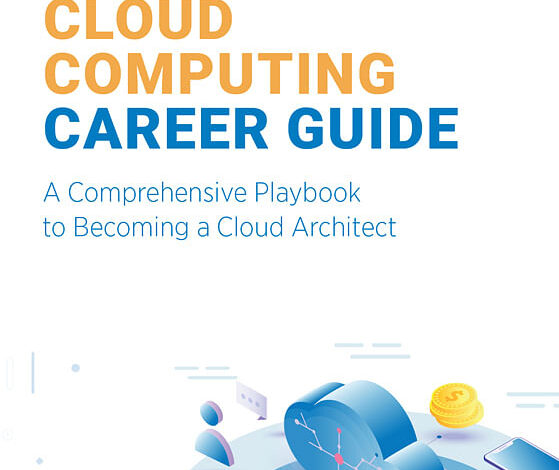Roadmap To Become A Cloud Architect

The field of Cloud Computing is drastically changing the way business is done across all industry sectors. The cloud is being adopted in increasing numbers for business. And in order to help you scale up in your career, we have crafted an exclusive cloud computing roadmap, as a part of this comprehensive cloud computing career guide which will help you navigate and chart your path to a successful career in this exciting industry.
Whether you’re just starting out in your career or looking to transition to a new field, cloud computing offers a wide range of opportunities for growth and advancement. From cloud architecture and design to security and compliance, there are many different roles and specializations to choose from. In this cloud computing career guide, you’ll find valuable insights and practical advice on how to build the skills and knowledge you need to succeed in the cloud computing industry. You’ll learn about the different types of cloud computing, the top cloud service providers, and the most in-demand cloud computing skills.
We’ll also provide you with resources and tools to help you get started, including a list of top cloud computing skills, job roles, certifications and a sample cloud computing roadmap. (Plus, you’ll get access to a free cloud computing roadmap pdf, so you can take it with you wherever you go.)
At Simplilearn, we’re committed to helping professionals like you succeed in the cloud computing industry. That’s why we offer a wide range of cloud computing courses and certification programs, designed to help you build the skills and knowledge you need to advance your career. Some of our most popular courses include:
1. Post Graduate Program in Cloud Computing, designed in collaboration with Caltech CTME
Simplilearn’s Post Graduate Program in Cloud Computing designed in collaboration with Caltech CTME is a comprehensive certification training course that equips learners with in-demand skills and knowledge needed to succeed in the cloud computing industry. This program covers a wide range of cloud technologies, including AWS, Azure, Google Cloud Platform, DevOps, and more. The course is designed to help learners gain hands-on experience with cloud platforms and tools, allowing them to build and deploy cloud-based solutions. Learners will also have access to industry experts and mentors, enabling them to receive personalized guidance throughout the program. By completing this program, learners will be well-prepared to pursue various cloud computing career paths, such as Cloud Engineer, Cloud Architect, and DevOps Engineer.
2. Cloud Architect Master’s Program
Simplilearn’s Cloud Solutions Architect Masters Program is an advanced training program designed for professionals who want to excel in cloud computing. The program provides a comprehensive understanding of the latest cloud computing technologies and tools, including AWS, Azure, Google Cloud Platform, and more. It is specifically designed to help learners develop the skills and knowledge necessary to become a successful Cloud Solutions Architect. The program includes hands-on projects and real-world scenarios, enabling learners to gain practical experience and apply their knowledge to real-world problems. Additionally, learners will have access to expert faculty and a supportive community of learners, allowing them to receive personalized guidance and support throughout the program. By completing this program, learners will be well-equipped to design and deploy complex cloud solutions, lead cloud migration projects, and manage cloud infrastructures effectively.
Your Cloud Computing Roadmap To Success
So whether you’re already in the cloud space looking to take your career to the next level, or you want to switch fields, our Cloud Computing Career Guide is your ultimate resource for success in this exciting and rapidly evolving industry. Download your copy to get a hang of the cloud computing space, then choose the program that best suits your learning needs and start charting your path to a successful career in cloud computing!
FAQs
1) Does cloud computing need coding?
Cloud computing does not necessarily require extensive coding skills. While coding knowledge can be beneficial for certain aspects of cloud computing, it is not a mandatory requirement for using cloud services or managing cloud infrastructure.
2) Is cloud computing a good career choice?
Yes, cloud computing is an excellent career choice with numerous opportunities for growth and advancement. Here are several reasons why:
- Increasing Demand
- High Salary Potential
- Versatility and Flexibility
- Continuous Innovation
- Career Progression
- Remote Work Opportunities
3) Is cloud a stressful job?
The level of stress in a cloud computing job can vary depending on various factors, including the specific role, the organization, workload, and individual preferences. While some individuals may find certain aspects of cloud computing challenging and potentially stressful, others may thrive in the dynamic and fast-paced nature of the field.
4) What skills are required for a career in cloud computing?
Some of the skills required for for a career in cloud computing, include:
- Strong understanding of cloud computing concepts and architecture
- Proficiency in cloud platforms
- Knowledge of virtualization, networking, and storage technologies
- Familiarity with scripting and automation
- Security and compliance knowledge related to cloud environments
- Understanding of containerization and orchestration
- Experience with cloud migration, deployment, and management
- Knowledge of DevOps practices and tools
- Problem-solving and troubleshooting skills
- Continuous learning mindset to keep up with evolving technologies and trends.
5) How can I start a career in cloud computing?
These are some of the steps you can follow to start a career in the cloud:
- Build a foundational understanding of cloud computing concepts
- Choose a specific cloud platform to specialize in (e.g., AWS, Azure, Google Cloud)
- Acquire relevant certifications from reputable providers
- Gain hands-on experience through practice labs, projects, or internships
- Develop scripting and automation skills
- Familiarize yourself with DevOps practices and tools
- Stay updated with industry trends and advancements
- Network with professionals in the field and join relevant communities
- Consider pursuing a degree or further education in cloud computing
- Apply for entry-level positions or internships in cloud computing
- Continuously learn and expand your skill set to adapt to evolving technologies
6) What are the different job roles in cloud computing?
Some prominent job roles include:
- Cloud Architect
- Cloud Engineer
- Cloud Administrator
- Cloud Developer
- Cloud Security Specialist
- Cloud Operations Manager
- DevOps Engineer
- Solutions Architect
- Data Engineer
- Cloud Consultant
- Cloud Support Engineer
- Cloud Project Manager



